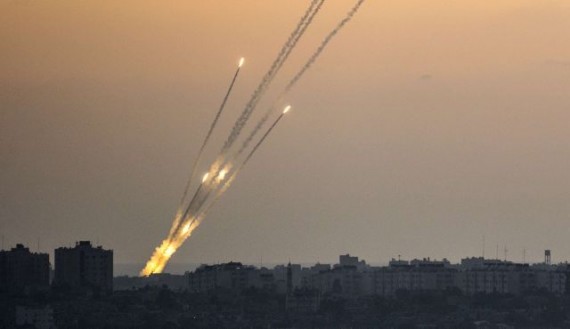Gaza Cease Fire Extended, But Prospects For Bigger Peace Deal Seem Dim
The two sides in Gaza keep extending the humanitarian cease fire, but remain miles apart on the major issues dividing them.
The Gaza cease fire was extended again, but the underlying issues still remain:
JERUSALEM — Israeli and Palestinian officials agreed late Monday to extend a five-day cease-fire for Gaza that expired at midnight for 24 hours, reflecting the difficulty of reaching more durable agreements after two weeks of Egyptian-brokered talks but also an apparent lack of appetite on either side to resume the conflict.
Azzam al-Ahmed, the head of the Palestinian delegation in Cairo, said in a statement, “The negotiations were supposed to end today, but the maneuvers of the Israeli delegation have prevented until now any progress.”
He added, “We hope that the next 24 hours will lead to an agreement or the circle of violence will continue.”
The Israeli government issued a statement around midnight saying the cease-fire would be extended “at Egypt’s request” to allow for negotiations to continue. Israeli officials have refused to comment on the content or progress of the talks.
The main demands of Hamas, the militant group that controls Gaza, are a complete lifting of the economic blockade on the Palestinian coastal enclave, allowing the free movement of people and goods in and out, the creation of a seaport, and the reconstruction of a long-defunct airport. Israel wants full demilitarization, a process that would strip Hamas, whose name is an Arabic acronym for the Islamic Resistance Movement, and other groups, of their weapons and prevent rearmament.
The conflicting demands reflected the sides’ broader agendas. Hamas wants to be able to show its people a clear achievement after a month of fighting that left more than 1,900 Palestinians dead and caused widespread devastation. Israel, in contrast, does not want Hamas to be rewarded in any way after a war in which 64 soldiers and three civilians were killed and Gaza militants launched more than 3,300 rockets and mortar rounds against Israel.
Israeli and Palestinian analysts were skeptical that the maximal demands of either side would be met in the foreseeable future.
“Concessions come with a high political cost for both sides,” said Ghassan Khatib, vice president of Birzeit University in the West Bank and a former spokesman for the Palestinian Authority government, “but it is equally costly for either side to resume that level of fierce confrontation.”
Mr. Khatib cast doubt on the prospects of reaching more ambitious, longer-term agreements, saying, “The positions are not reconcilable.” Prime Minister Benjamin Netanyahu of Israel “is not in a position to give concessions to Hamas that appear to give it political gains,” he said, “and it will be very embarrassing for Hamas to be part of agreements that don’t end the closure after all the sacrifice.”
In other words, the situation remains pretty much the same as it was before the war started. If anything has changed in that time, it would seem to be that the Israelis have become understandably more hard line in their position that Gaza must be demilitarized, a position that seems reasonable given both the constant rocket barrages that they have endured during the war and the discovery of more than three dozen tunnels dug under the surface from Gaza into Israel proper which were clearly designed to be conduits for terrorist attacks, kidnappings, or other similar raids into Israel. Indeed there have been some reports that Israeli intelligence had uncovered information that Hamas had been planning to use the tunnels for a massive attack against Israeli civilian areas during the Jewish holidays in September. Given this, and the fact that this was the third time in less than ten years that Israel has been forced to engage in military action in Gaza in response to rocket attacks on civilian targets, it isn’t surprising that they’d want on the other hand. Hamas, on the other hand, clearly thinks it needs to show something tangible for all of the damage that its actions have inflicted on Gaza for the third time in ten years. Unless its negotiators are entirely irrational, though, they have to know that lifting the blockade is simply not something that is going to happen so easily or so quickly. If they want that to happen, they are going to have to prove that they can be trusted. So far, they have not been.
Given the positions from both sides, it isn’t hard to see why it’s proving difficult to reach a long term peace deal. Obviously, there’s likely a difference between the public position that both sides are taking and what’s going on in the negotiating room, but the fact that the Cairo talks have been able do accomplish little more than extended THe

I’m reminded of a passage in The Best and the Brightest. There has been a grenade attack on a cafe in Saigon or some such incident. Johnson’s cabinet is discussing whether or not to use the incident to ramp up the war. One of the junior members suggests they can’t miss the opportunity afforded by this incident to do what they wanted to do anyway. A more seasoned member remarks that, ‘Incidents are like buses. There’ll be another one along shortly.’ Israel decides when they’re “forced” to respond.
They need to figure out an endgame.
Cease fire is now cancelled. http://www.washingtonpost.com/world/middle_east/gaza-cease-fire-breaks-as-militants-rocket-attacks-spark-retaliatory-israeli-airstrikes/2014/08/19/46ca861e-27b0-11e4-958c-268a320a60ce_print.html
You’re gonna want to put a timeout timer on the cease fire posts
D, the last paragraph in your piece was truncated.
BTW, Hamas is now bragging that its people kidnapped and killed the three Israeli teenagers whose murders started this latest round.
i think the shark jumped on this, even the msm has trouble now that the pali’s are essentially confirming what Israel says about them. oh, there’s a white cop slaying black’s in missouri…
let’s go there.